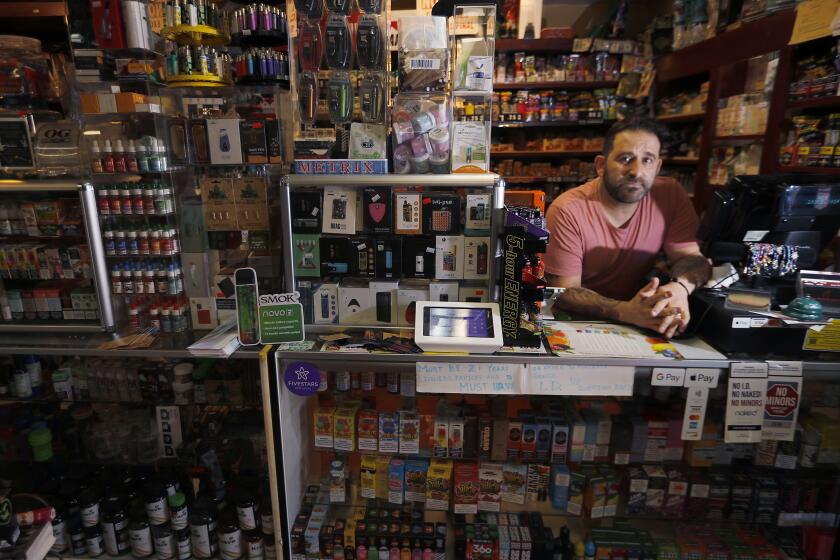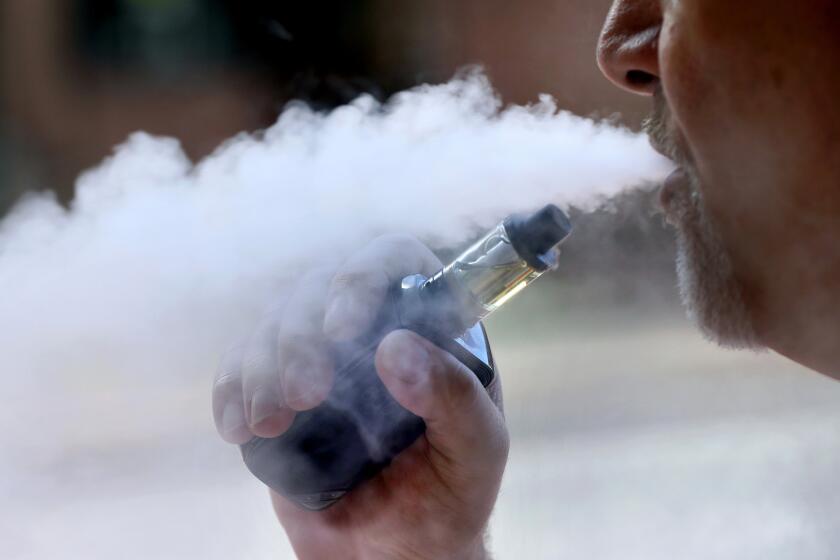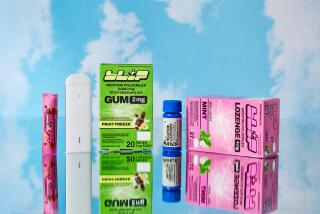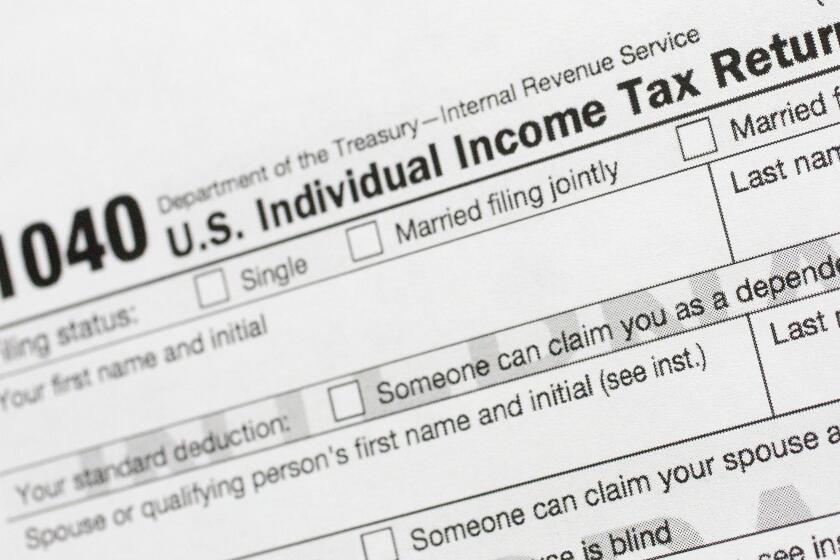Upstart L.A. company pulls back Puff Bar single-use vaping product after outcry
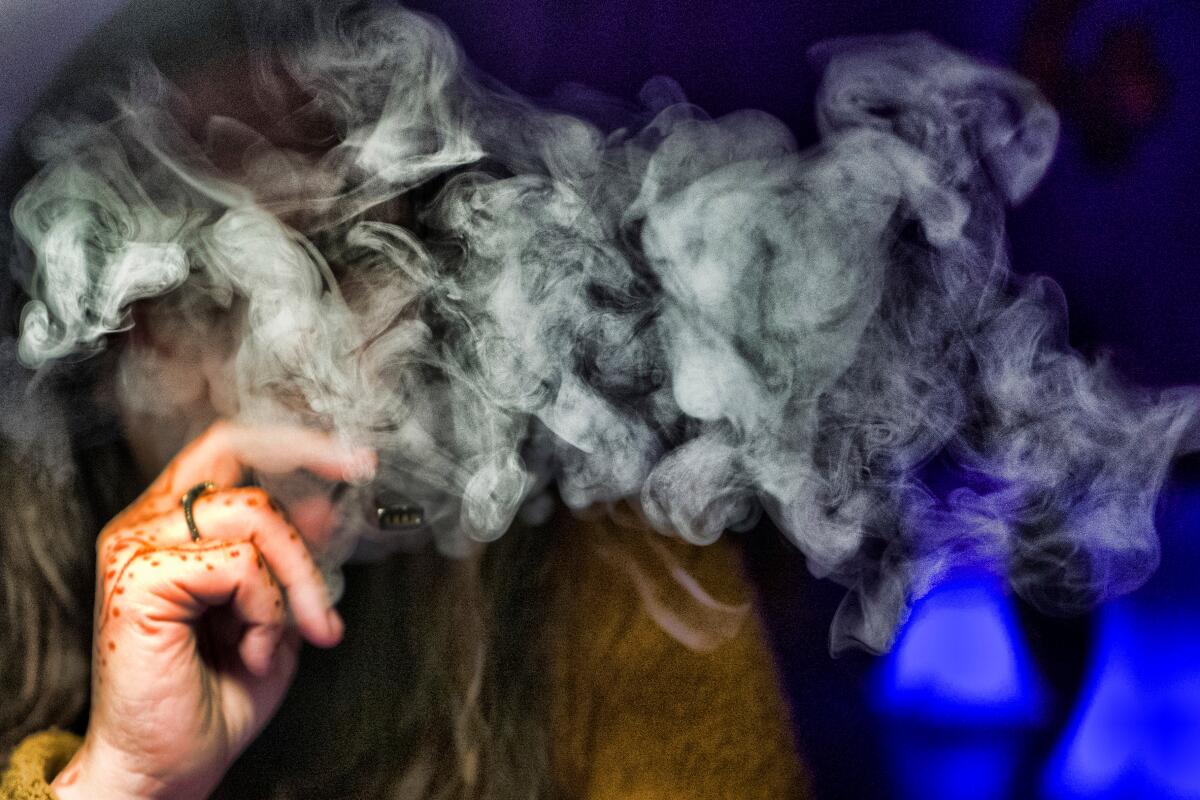
On a sunny Friday afternoon on Los Angeles’s skid row, two men climbed through a gap in a half-shuttered storefront across the street from a sidewalk homeless encampment. The unassuming building is the headquarters of the nation’s hottest vaping company.
One of the men, who said his name is Shahid Shaikh, is chief operating officer of Cool Clouds Distribution Inc., which says it is the seller of Puff Bar disposable e-cigarettes. Sales of the devices have surged thanks to a loophole in new federal restrictions on flavored vaping products, leading critics to blame them for creating a new twist in a public health crisis. The murky origins of Puff Bars and a legion of shadowy imitators have only added to the concerns of health officials and parents.
Shaikh said he doesn’t understand the uproar.
“What’s sketchy about this?” he said.
Brands like Puff Bar are filling shelves in convenience stores and vape shops across the country with flavors like Strawberry Donut and Café Latte. While regulators banned most flavored e-cigarettes this year, Puff Bar and its peers have proliferated thanks to a footnote that creates a safe space for devices meant to be used once and thrown away. That has alarmed anti-tobacco advocates worried they will addict more young users to nicotine.
Vape shops thrived even in the age of Amazon, but now they face an uncertain future amid worries over teen vaping and a mysterious lung ailment.
Days after a reporter visited the company’s office, Cool Clouds founder and Chief Executive Umais Abubaker, who signs emails with and says he goes by the name Max Baker, said the company has “ceased all distribution” of Puff Bar products in the U.S. and stopped licensing to “prevent third parties from distributing in the U.S.”
“Cool Clouds is vehemently opposed to illegal use of the Puff Bar by minors, has not engaged in any marketing, and does not operate any e-commerce websites or social media,” he said.
Puff Bars had been taking off. In the four weeks ended Jan. 26, sales reached $3.3 million, up from $14,000 a few months ago, according to data from market researcher IRI — but still tiny when compared with vaping giant Juul Labs Inc.’s $187.3 million in sales in the four weeks ending Feb. 9. The swift growth reflects how vapers are rapidly shifting from one product to another as regulators scramble to clamp down on devices that appeal to minors. Analysts say the curbs on devices like Juul’s mean disposable vaporizers have room to grow.
Public health advocates have been critical of the Food and Drug Administration’s approach to regulating e-cigarettes. They say the agency’s decision to allow some products to remain on the market pending authorization has harmed consumers.
“The sheer fact that these products are on the market underscores how FDA has failed to enforce the law,” said Erika Sward, assistant vice president of national advocacy at the American Lung Association.
Puff Bars are easy to use right out of the box. Their potent flavors emit a pungent scent when removed from their wrapping; a banana ice flavor smells like Laffy Taffy candy. They also come in loud colors: Banana ice is bright yellow; pink lemonade is hot pink.
Warehouses surrounding the Cool Clouds headquarters are packed with boxes of the devices, filling the air with a faint cotton-candy aroma. Posters on the wall inside advertise that Puff Bar, “LA’s favorite disposable device,” is “Sold Here.” A warehouse down the street used by GG Distribution, one of Puff Bar’s distributors, is painted black with Puff Bar’s white cloud logo.
GG Distribution owner Saquib Shoaib declined to comment.
Mitch Zeller, head of the FDA’s Center for Tobacco Products, said in a statement that available data show that cartridge-based e-cigarettes are the most appealing to kids and that the flavor policy gives the FDA the ability to review any e-cigarette that may get in the hands of minors.
“Let us be clear,” said Zeller. “Under this policy, if we see a product that is targeted to kids, we will take action.”
While Puff Bar still represents a sliver of the overall e-cigarette market, its rapid success shows the game of public health whack-a-mole regulators often face.
Former FDA Commissioner Scott Gottlieb raised concerns about Puff Bar in a series of tweets after the flavor curbs were unveiled, pointing out the footnote in the regulation and asking where it would leave products like Puff Bar, which with its many flavors and “sleek Juul-like form” are “rapidly gaining popularity among kids.”
“Kids’ attitudes and behaviors can evolve very quickly,” Gottlieb said in an interview. “So if youth use of e-cigarettes is shifting toward disposable products, that can happen quickly and basically evolve to epidemic use of these products before regulators spot it.”
Counterfeiters have also flooded the market with devices that look and work like Puff Bars, making it even harder for regulators to control the marketplace. While Juul and others have also struggled to prevent fake products from reaching consumers, Puff Bar has attracted an especially fast-moving group of imitators.
“There is only one authentic Puffbar device, which can be identified by the authentication code and verified on Puffsalt.com,” Abubaker, the Cool Clouds CEO, said. “The code on an authentic product package can be scratched off and registered on the site to confirm that it is authentic. All other products are counterfeit.”
Most vaping devices, Puff Bar included, are manufactured in Shenzhen, China. Websites in China including Alibaba, DHgate and Made-In-China.com, list products labeled as Puff Bars selling in bulk for as little as $1.60 each.
Juul has hired former FDA employees and is recruiting researchers as the e-cigarette giant prepares for an important regulatory deadline.
One of the Puff Bar products listed on Made-In-China.com is sold by Shenzhen Huaxinyu Technology Co. A company representative said its product is “only a little different” from Puff Bar, and the liquid they use is from the “original factory.” Shenzhen’s production capacity is 10,000 devices a week, according to its page on Made-In-China.
DS Vaping, based in Shenzhen, is “the only manufacturer who was ever licensed to use” the Puff Bar “marks,” Abubaker said.
The FDA started regulating e-cigarettes on Aug. 8, 2016. Products that were on the market before that date were allowed to remain for sale, but are required to submit applications with the FDA by May 12 to stay on the market. New products were effectively barred until they could be authorized by regulators.
Bloomberg Intelligence analyst Ken Shea said he doesn’t expect Puff Bar will “pass FDA muster in May,” when companies must submit applications for any e-cigarette they want to keep selling — regardless of the form or flavor.
Regulators expect companies to submit a trove of data, including scientific studies and analyses into how products might help adults who want to quit smoking, and whether they’ll attract kids and nonsmokers. Conducting the research and compiling the application take an enormous amount of time and money.
Cool Clouds is planning to file an application, Abubaker said in an email. “Cool Clouds looks forward to reintroducing the Puffbar in the United States after taking necessary measures,” he said.
More to Read
Inside the business of entertainment
The Wide Shot brings you news, analysis and insights on everything from streaming wars to production — and what it all means for the future.
You may occasionally receive promotional content from the Los Angeles Times.
